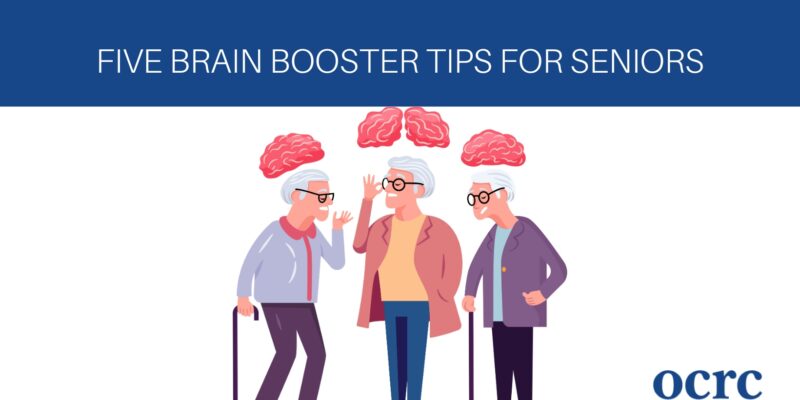
Just as you would with any other part of your body, it’s essential to exercise your brain to keep it in optimal condition. This becomes even more crucial as you age. Although cognitive issues are increasingly common the older you get, there are steps you can take to keep your brain agile. Learn five of the best brain booster tips for seniors.
One of the best tips for seniors is to get some exercise. While you might think that this will only benefit your physical health, exercise improves cognitive function by promoting neurogenesis (the development of new neurons) and the formation of new synapses.
Aerobic exercise improves blood circulation to the brain, resulting in more oxygen and nutrients. Weightlifting and other types of resistance training positively impact memory and executive function.
Exercise also reduces stress levels. This is crucial because stress decreases cognition and impacts concentration, memory, and many other brain functions.
Social interactions engage the same areas of the brain involved in memory and thinking. This means spending time with others or even chatting on the phone can help strengthen your cognitive functions. Studies have shown that seniors with large social circles score higher in cognitive tests.
It’s also important to note that feelings of isolation can trigger pro-inflammatory genes and shut down anti-inflammatory markers, causing spikes in blood pressure and many other issues that affect cognition. On the other hand, staving off feelings of loneliness with social interactions helps to preserve cognitive functioning, providing intellectual and emotional stimulation. So whether it means making a new friend or meeting an old one for dinner, spend time with others and keep your brain healthy.
One of the most vital tips for seniors is to get the right amount of sleep — healthy sleeping patterns help preserve cognitive function. When you sleep, you’re also consolidating memories, improving your retention of new information, reducing stress, and increasing concentration levels. But not getting enough sleep increases amyloid deposits, a protein associated with Alzheimer’s disease.
Seniors should try to get between six and eight hours of sleep each night. However, sleeping more than eight hours can increase a senior’s risk of getting dementia.
Your brain needs the right nutrients, and that only happens if you eat well. Poor nutrition leads to faster cognitive decline, depression, and anxiety. So, introduce more fruits and vegetables into your diet, and consume less protein and fat. Consuming a diet that is rich in anti-inflammatory components and antioxidantshelps reduce age-related cognitive decline. However, you should limit your salt and sugar intake.
A healthy diet also has an effect on your cardiovascular health, helping to prevent the development of vascular dementia that’s caused by reduced blood flow to the brain. Furthermore, scientists have noticed connections between heart health and brain health, with any damage to your heart and blood vessels increasing the risk of developing dementia.
Seniors who participate in stimulating activities (like pursuing meaningful hobbies) tend to experience better memory function and feel less lonely when compared with those who stick to more passive activities like watching TV.
Learn something new to keep your brain functioning at its best. Consider teaching your favorite hobby to someone else. Turn to games and puzzles to sharpen thinking skills — you can always find brain health games online that target various cognitive issues you may be experiencing.
Seniors also benefit from learning to use new technologies, since it requires activating the learning centers of the brain while also offering the chance to interact socially.
Implementing these five brain health tips for seniors goes a long way toward maintaining and improving cognitive health while helping you maintain your independence as you grow older. By eating the right foods, getting enough sleep, and finding ways to stimulate your brain and remain social, you can lower your risks of developing cognitive issues like dementia.
At Orlando Clinical Research Center, we specialize in conducting Phase I-IV clinical trials for new medications and treatments. We offer the chance to also participate in clinical trials and research studies. Contact us today to learn more.
